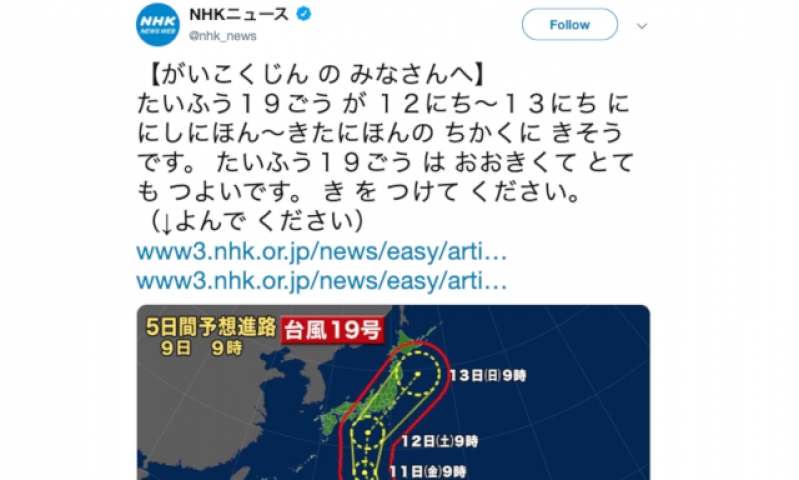 The warning from NHK is considered odd by some because it used hiragana instead of kanji. (Image via SoraNews24)
The warning from NHK is considered odd by some because it used hiragana instead of kanji. (Image via SoraNews24)
NHK's typhoon warning reaps controversy, hiragana over kanji
As Japan is anticipating the typhoon 19, dubbed as Typhoon Hagibis, Japan Meteorological Agency, and Japan’s national broadcaster, Nippon Hoso Kyokai (NHK), had circulated warning for both Japanese residents and visitors for the typhoon.Typhoon Hagibis came on Thursday morning with 270km/h wind speed, causing temporal service halts and even cancellations of rugby matches of the 2019 Rugby World Cup. Currently, Japan is hosting the 2019 Rugby World Cup.
However, from all the warnings, NHK’s warning caught people’s attention. On its official Twitter account, NHK gave a warning for foreigners visiting Japan. The warning did not consist of a single kanji, but it was written with hiragana alone.
At the end of the warning, NHK also gave links to the “News Web Easy”, an NHK-owned website containing various news with a mixture of kanji and hiragana. What makes it easy? Above the kanji, there are kana (smaller hiragana) inscriptions, making it easier to understand.
Senior journalist at NHK, Taguchi Hiro, said that the hiragana warning was more effective than kanji-containing ones.
The tweet said that all foreigners should be careful of the big, strong typhoon no. 19 is approaching West to North Japan from 12 to 13 October.
Naturally, there is nothing wrong with the message, except the fact that it does not contain a single kanji like an ordinary Japanese text. For some Japanese, they considered the warning as “dumbing” the Japanese language. Japanese people never only write in hiragana, but incorporating some kanjis into it.
Meanwhile, foreigners also showed mixed feelings. Some foreigners replied to the tweet by bashing NHK for not releasing warnings on other languages.
However, some foreigners defended NHK, stating that not all foreigners speak English; thus, the warning was quite helpful, instead of the kanji-containing warnings. NHK emphasized at the beginning of the warning that the hiragana was meant for the “foreigners”. Some foreigners also hailed NHK’s warning’s simplicity for the Japanese with the difficulty of learning kanji.
Source: https://bit.ly/2MA1lvB
 English
English Japan
Japan

neurontin and magnesium gabapentin 900 mg capsules how long does neurontin withdrawal last how much gabapentin to get high
how long does viagra take to work female viagra pills generic viagra 100mg pills for men viagra alternative what insurance does walmart accept when does viagra go generic vitamins for sexual benefits for men
cipro vs zithromax azithromycin prices uk what is zithromax used for azithromycin treats what std
1000 sex games [url="https://cybersexgames.net/?"]dating sim sex games[/url] riley reid nubiles porn sex games gif
is furosemide lasix [url=https://la-si-x.com/#]lasix 40 mg daily [/url] mag3 renal scan with lasix interpretation what is lasix high dose
prednisone arthritis [url=http://pred-ni-sone.com/#]can you purchase prednisone for dogs without a prescription [/url] how long for prednisone to work how long can a dog be on prednisone for cancer
drinking too much grapefruit juice viagra printable coupons viagra pornhub walgreens pharmacy sildenafil citrate 20mg what does female viagra do free prescriptions at walgreens natural viagra alternatives that work viagra cost fda approved generic viagra best male enhancement pills at gnc how to cure ed naturally without drugs sildenafil use for pulmonary hypertension viagra pill funny jokes for ladies fda approved weight loss drugs what is viagra cialis 30 day coupon generic alternative to viagra drugs that decrease libido dr oz ed pills homemade viagra mucinex samples for health professionals when do you need viagra natural viagra for men does cvs take goodrx coupons proper use of sildenafil women viagra cialis offer goodrx prescription drugs price of viagra in mexico viagra price stacking viagra and levitra
prednisone for cats does prednisone make you constipated how long does prednisone work after you stop taking it
arthritis medicine plaquenil hydroxychloroquine (plaquenil) coupons how long does it take for plaquenil to start working
priligy pastillas dapoxetine online pharmacy dapoxetine 30 mg side effects where can you buy dapoxetine not online
plaquenil for covid19 plaquenil tablets icd 10 code for plaquenil eye exam what does plaquenil do for rheumatoid arthritis
dapoxetine half life [url=http://pri-li-gy.com/#]priligy prescription usa [/url] can i take cialis and priligy together why isnt dapoxetine available in the us
whats amoxicillin for amoxicillin script ebv amoxicillin rash dose amoxil clav uti 80 pound canine
durvet ivermectin paste [url=http://stro-mec-tol.com/#]ivermectin 50ml [/url] ivermectin 3 mg pill image how to use ivermectin paste for dogs infected with hearworms
cialis 10 mg tablet hernia mesh lawsuit settlement amounts causes of ed price for viagra flomax low semen how is sildenafil made
provigil mechanism flmodafinil vs modafinil how to get provigil online how does provigil work?
modafinil psychosis [url=https://pro-vi-gil.com/#]modafinil canada pharmacy [/url] is modafinil covered by medicaid why is the manufacturer of provigil wanting to reinburse for the last 10 years
best generic viagra websites what happens if a girl took viagra viagra tablets price of viagra at walmart does generic viagra really work
modafinil like drugs modafinil pricing provigil level 3 security monirtor how to turn off modafinil
metronidazole and ivermectin [url=https://stro-mec-tol.com/#]ivermectin 0.08 oral solution [/url] ivermectin for flea and tick control how long does ivermectin take to kill mites
azithromycin traveler's diarrhea zithromax uk does zithromax cure gonorrhea and chlamydia how to pronounce azithromycin
generic viagra 150 mg walmart printable coupons how to address more than one person viagra para mujeres viagra prices at cvs pharmacy cvs caremark cialis prior authorization best generic viagra reviews